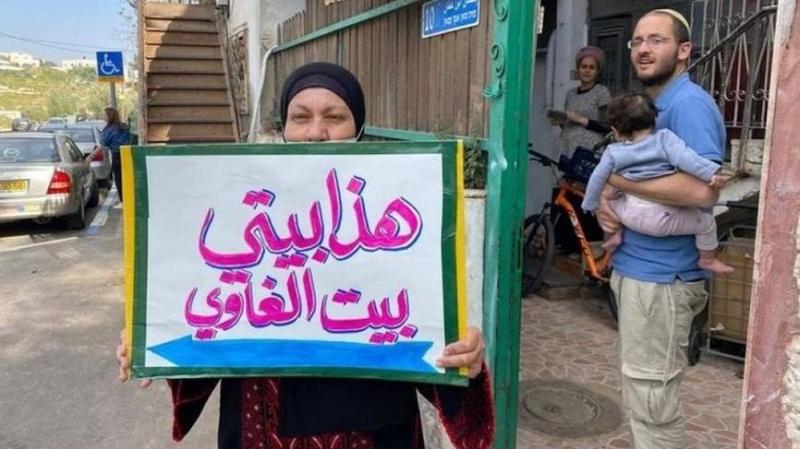Israeli police deployed a large number of its forces to Jerusalem early Friday, particularly in the Old City, closing surrounding streets and roads leading to Al-Aqsa Mosque during the last Friday of Ramadan. Tensions renewed on Thursday evening in the Sheikh Jarrah neighborhood of East Jerusalem amid an ongoing legal battle over the fate of Palestinian families threatened with eviction in favor of Israeli settlers. The Red Crescent announced around twenty Palestinians were injured on Wednesday-Thursday night during clashes with Israeli police, which reported the arrest of 11 individuals.
However, on Thursday evening, just hours after the Supreme Court scheduled a new hearing for Monday regarding the threatened families, right-wing Israeli Knesset member Itamar Ben Gvir from the radical "Jewish Power" party went to the Sheikh Jarrah neighborhood to support a settler family by repeatedly saying "this house is ours" in Hebrew. Palestinians threw projectiles at a tent set up by settlers in front of one of the homes and exchanged insults with Ben Gvir. Meanwhile, Israeli police reported the arrest of seven people and deemed the situation "under control."
Nabil al-Kurd (77), one of the threatened families, reiterated, "This land is Palestinian... We are residents of this neighborhood, and we cannot accept that this land belongs to them; this is our land." Tensions arise over the ownership of the land occupied by homes where four Palestinian families live. Earlier this year, the Central Court in Jerusalem ruled to evict four homes inhabited by Palestinians who claim to have rental agreements provided by the Jordanian authorities that managed East Jerusalem between 1948 and 1967, proving their ownership of the properties in the neighborhood.
This came in support of claims made by Jewish settlers for ownership of these homes, asserting that Jewish families lived there before fleeing during the 1948 war with Israel's establishment. The court's decision sparked outrage among Palestinians who challenged it, leading to protests that often resulted in clashes with the police.
An appeal was requested, and the court asked both parties to reach a settlement. The Supreme Court held a hearing on Thursday at the request of the Palestinian families. Palestinian attorney Sami Arshid stated during a press conference after the session that "the Supreme Court judge decided to listen to the appeal made by the families' lawyers before a panel of three judges next Monday."
The lawyers presented the response from the Palestinian families, rejecting the proposal from the settler organization "Nuhalat Shimon" to temporarily recognize the family residents as protected tenants, with the homes reverting to the organization after their death. The families firmly rejected this proposal, stating through commentator Aref Hamad during the conference that what is being done against them constitutes a "war crime."
The statement called for both the Jordanian government and the Palestinian Authority to urgently approach the International Criminal Court to stop the "war crime" against them. The families appealed to Jordan and the international community, including the European Union, to assume responsibility.
The Jordanian Foreign Ministry released documents concerning 28 families in the neighborhood, which was under Jordanian sovereignty along with East Jerusalem and the West Bank before being occupied by Israel in 1967, in a move not recognized by the international community, to support the Palestinians' stance on the issue. The head of the High Follow-Up Committee in the Israeli Knesset, Muhammad Barakeh, confirmed the arrival of "official documents signed by Jordan... related to legal legitimacy before Israeli courts."
Israeli courts often issue rulings supporting demands made by settler organizations, while the same does not apply to properties and homes initially inhabited by Palestinians and later occupied by Jews after the departure of Palestinians. Jewish organizations claiming ownership currently seek to evict 58 other Palestinians, according to the organization "Peace Now." Palestinians estimate that approximately 500 of them are at risk of eviction.
Over 200,000 settlers live in occupied East Jerusalem among 300,000 Palestinians. Settlement is considered illegal under international law. Mona al-Kurd (23), who faces the risk of eviction from her family home, stated that settlers "do not possess any documents proving their ownership." Meanwhile, Jonathan Youssef, an activist from the "Nuhalat Shimon" settler organization, stated that every Jew owning land will act as they wish if the court rules in their favor. "The Palestinians reject any compromise, and this is their problem," he added.
Protests in the neighborhood have continued for over ten days after iftar hours, with residents and activists gathering to chant songs and national slogans and perform traditional Palestinian dances. In Gaza, Mohammad Deif, commander of the military wing of Hamas, issued a "final warning" to Israel on Tuesday, stating, "If the aggression against our people in Sheikh Jarrah does not stop, we will not remain idle," adding, "The enemy will pay a heavy price."
The UN Special Coordinator for the Middle East Peace Process, Tor Wennesland, urged Israel to halt eviction orders against homes in East Jerusalem and to exercise restraint.




